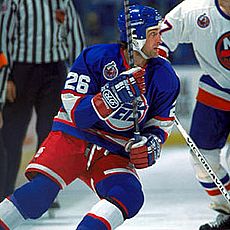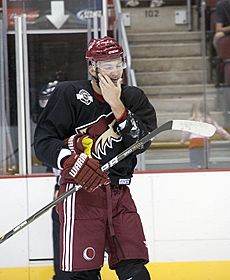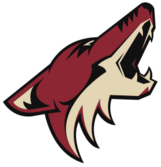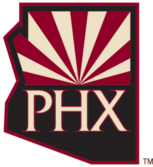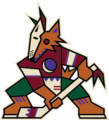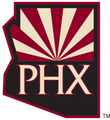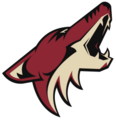Arizona Coyotes facts for kids
Quick facts for kids Arizona Coyotes |
|
|---|---|
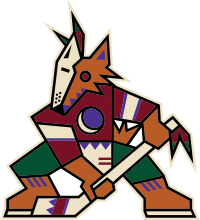 |
|
| Founded | 1972 |
| History | Winnipeg Jets 1972–1979 (WHA) 1979–1996 (NHL) Phoenix Coyotes 1996–2014 Arizona Coyotes 2014–2024 |
| Home arena | America West Arena (1996–2003) Gila River Arena (2003–2022) Mullett Arena (2022–2024) |
| City | |
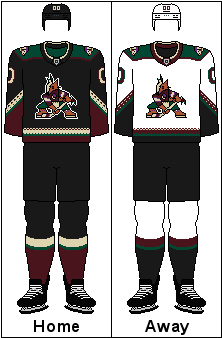 |
|
| Colors | Process black, brick red, forest green, sand, sienna, purple |
| Stanley Cups | 0 |
| Conference championships | 0 |
| Presidents' Trophies | 0 |
| Division championships | 1 (2011–12) |
The Arizona Coyotes were a professional ice hockey team. They played in the National Hockey League (NHL). The team was based in the Phoenix metropolitan area in Arizona. They were part of the Western Conference.
The Coyotes played in different arenas over the years. These included America West Arena (1996–2003), Gila River Arena (2003–2022), and Mullett Arena (2022–2024). The team started as the Winnipeg Jets in 1972. They were part of the World Hockey Association (WHA).
In 1979, the Jets joined the NHL when the WHA closed. Due to money problems, the team moved to Phoenix in 1996. They were then called the Phoenix Coyotes. The name changed to Arizona Coyotes in 2014. The team faced many challenges, including finding a permanent home arena.
The NHL took over the team in 2009 when the owner filed for bankruptcy. New owners took over in 2013. The team played at Mullett Arena, a college arena, from 2022 to 2024. This was meant to be a temporary home. However, plans for a new arena in Tempe were rejected by local residents in May 2023.
Because of the ongoing arena issues, the Coyotes stopped playing hockey after the 2023–24 season. The team's players and staff moved to a new expansion franchise in Salt Lake City, Utah. The Coyotes' name and history were kept by the owner, Alex Meruelo. He hoped to build a new arena in Arizona by 2029. However, a land auction for the arena site was canceled in June 2024. Meruelo then gave up his rights to the team.
Contents
- Team History: From Jets to Coyotes
- Team Information
- Team Records and Achievements
- Images for kids
- See also
Team History: From Jets to Coyotes
The Original Winnipeg Jets (1972–1996)
The team began as the Winnipeg Jets. They were one of the first teams in the World Hockey Association (WHA). The Jets were very successful in the WHA. They won the Avco World Trophy, the league's championship, three times.
In 1979, the WHA closed down. The Jets were one of four teams that joined the NHL. However, they struggled in the NHL. They lost many of their best players when they joined the new league. The Jets finished last in their first two NHL seasons.
They improved over time, making the playoffs many times. But they often faced strong teams like the Edmonton Oilers and Calgary Flames. This made it hard to win playoff series. The team did not win another playoff series for 25 years after 1987.
The Jets faced money problems in the 1990s. Player salaries were getting very high. Winnipeg was a small market for an NHL team. Their arena, Winnipeg Arena, was also old and small. Despite strong fan support, the team's owner had to sell it.
Moving to Phoenix: Becoming the Coyotes
In 1995, businessmen Steven Gluckstern and Richard Burke bought the team. They planned to move it to Phoenix, Arizona. The move happened on July 1, 1996.
The team held a contest to choose a new name. "Coyotes" was chosen over other names like "Mustangs" and "Scorpions". The coyote is an animal found all over Arizona. This made it a good fit for the team's new home.
Early Years in Arizona (1996–2005)
When the team arrived in Phoenix, they added star player Jeremy Roenick. He joined Keith Tkachuk and Rick Tocchet. These players created a strong offense. Young players like Shane Doan and goalie Nikolai Khabibulin also played well. Shane Doan was the last player from the Winnipeg Jets to play for the Coyotes.
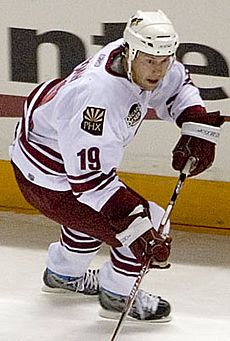
The Coyotes made the playoffs in most of their early years in Arizona. In 2001, they earned 90 points but still missed the playoffs. This was unusual for a team with so many points.
The team's first home in Phoenix was America West Arena. It was built for basketball, not hockey. The rink barely fit, and some seats had blocked views. This meant fewer fans could attend games.
In 2001, Steve Ellman bought the team. Wayne Gretzky, a famous hockey player, became a part-owner. The team moved to a new arena in Glendale in 2003. This new arena was called Glendale Arena. At the same time, the team changed its logo and uniforms.
The Gretzky Era (2005–2009)
On August 6, 2005, Brett Hull joined the team. His father, Bobby Hull, had played for the original Jets. Two days later, Wayne Gretzky became the head coach. He had never coached before.
The Coyotes planned to host the 2006 NHL All-Star Game. But the event was canceled because of the 2006 Winter Olympics. The team returned to Winnipeg for a preseason game in 2006.
The team struggled in the 2006–07 season. They had their worst record since moving to Phoenix. In 2007, Don Maloney became the new general manager. The team tried to rebuild with young players like Peter Mueller and Martin Hanzal.
Goalie Ilya Bryzgalov joined the team in November 2007. He played very well, even getting a shutout in his first game. The Coyotes played better in the 2007–08 season. They finished with 83 points, but still missed the playoffs.
Playoff Success and Division Title (2009–2012)
In September 2009, Dave Tippett became the new head coach. Wayne Gretzky stepped down. Tippett quickly led the Coyotes to success. In the 2009–10 season, they had their first 50-win season in NHL history.
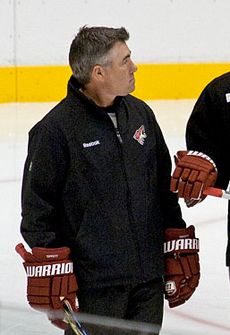
On March 27, 2010, the Coyotes made the playoffs. This was their first playoff appearance since 2002. They also reached 100 points for the first time as an NHL team. They finished with 107 points, their highest ever. This earned them a home-ice advantage in the playoffs.
They played the Detroit Red Wings in the first round of the 2010 Stanley Cup playoffs. The Red Wings won the series in seven games. The Coyotes faced Detroit again in the 2011 playoffs and lost in four games.
On April 7, 2012, the Coyotes won the Pacific Division title. This was their first and only division title as an NHL team. They defeated the Chicago Blackhawks in six games in the first round. This was the team's first playoff series win since 1987. They then beat the Nashville Predators in the second round. However, they lost to the Los Angeles Kings in the conference finals. The Kings went on to win the Stanley Cup that year.
Financial Challenges and Ownership Changes
The Coyotes faced serious financial problems. In 2009, the owner, Jerry Moyes, filed for bankruptcy. He wanted to sell the team to a Canadian billionaire who planned to move it to Hamilton, Ontario. The NHL stepped in and bought the team to keep it in Arizona.
The NHL managed the team for several years. They looked for new owners who would keep the team in Phoenix. Several deals fell through. The city of Glendale had to help cover the team's losses.
In 2011, the Atlanta Thrashers moved to Winnipeg and became the "new" Winnipeg Jets. This ended any chance of the Coyotes returning to Manitoba. The original Jets' history stayed with the Coyotes organization.
New Owners and the Arizona Coyotes (2013–2024)
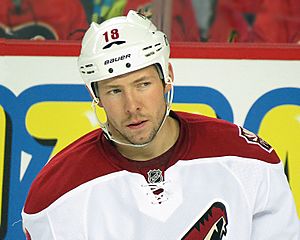
On July 2, 2013, the Glendale City Council approved a deal with a new ownership group. This group, Renaissance Sports and Entertainment (RSE), bought the team from the NHL. The deal aimed to keep the team in Arizona.
On January 29, 2014, the team announced a name change. They would become the "Arizona Coyotes" for the 2014–15 season. This change showed that the team represented the entire state, not just Phoenix. The name officially changed on June 27, 2014.
In 2014, Andrew Barroway bought a controlling share of the team. The team struggled on the ice, finishing last in their division in the 2014–15 season. The city of Glendale tried to end its agreement with the Coyotes in 2015, but they later reached a new two-year deal.
In 2016, John Chayka became the youngest NHL general manager ever at age 26. The team also hired Dawn Braid as their skating coach. She was the first female full-time coach in the NHL.
The Coyotes announced plans for a new arena in Tempe in 2016. However, these plans were later withdrawn. In 2017, Barroway became the sole owner of the team. Long-time captain Shane Doan was not re-signed. Rick Tocchet became the new head coach.
In 2019, Alex Meruelo became the main owner of the Coyotes. The team moved to the Central Division in 2021. After the 2020–21 season, Rick Tocchet left as coach. Andre Tourigny was hired as the new head coach.
For the 2021–22 season, the Coyotes moved back to the Central Division. In August 2021, the city of Glendale decided not to renew the team's arena agreement. The Coyotes then started talks with Tempe for a new arena.
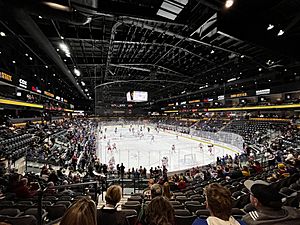
In December 2021, the Coyotes faced issues with unpaid taxes for their arena. They paid the bills the next day. In February 2022, the Coyotes signed a three-year deal to play at Mullett Arena. This arena is on the campus of Arizona State University. It is a smaller arena, meant to be temporary. The Coyotes played their final game at Gila River Arena on April 29, 2022. They debuted at Mullett Arena on October 28, 2022.
Team Assets Move to Utah
A plan for a new arena in Tempe was rejected by residents in May 2023. The team continued to play at Mullett Arena for the 2023–24 NHL season. The Coyotes explored other arena options in Mesa and Phoenix, but these plans did not work out.
On April 10, 2024, news broke that the Coyotes were moving to Salt Lake City, Utah. The NHL bought the team and then sold it to Ryan Smith. He owns the Utah Jazz basketball team. The new Utah team would play at the Jazz's arena, the Delta Center.
On April 17, 2024, the Coyotes played their final game at Mullett Arena. Fans wore white and cheered for the team. The Coyotes won their last game 5–2. After the game, players stayed on the ice, giving away gear and thanking fans. The next day, the sale and move were officially approved.
The Utah team is considered a new expansion team. The Coyotes' player contracts and staff moved to Utah. However, the Coyotes' name, history, and records stayed with owner Alex Meruelo. He had five years to build a new arena in Arizona. If he succeeded, the Coyotes could return as an expansion team.
However, on June 21, 2024, a land auction for a new arena site in Phoenix was canceled. A few days later, Meruelo announced he would not pursue further arena plans. On July 10, he officially gave up his rights to the team and its history.
Team Information
Team Name and Colors
When the team moved to Phoenix in 1996, fans voted on the new name. "Coyotes" won because coyotes live in the Sonoran Desert of Arizona. On June 27, 2014, the team changed its name to "Arizona Coyotes". This was to include all hockey fans in the state.
Logos and Jerseys
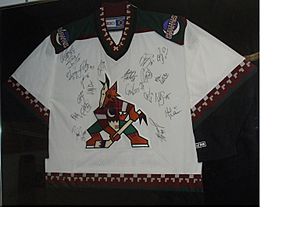
When they first arrived in Phoenix, the team used a Southwestern design. Their main logo was a coyote in a kachina style. The jerseys had green shoulders and red trim. These uniforms were used until 2003.
In 2003, the Coyotes changed their look. They adopted a howling coyote head logo. The main colors became Sedona red and white. Desert sand and black were used for trim. The team also added a shoulder patch. It showed the outline of Arizona with "PHX" inside.
In 2007, all NHL teams updated their jerseys. The Coyotes' white jersey gained red shoulders. For the 2008–09 season, they added a black third jersey. It had a new alternate coyote logo.
Before the 2014–15 season, the "PHX" patch on the jerseys changed to "AZ". This matched the team's new name, Arizona Coyotes. In 2015, the team updated its jerseys again. They brought black back into the design.
The Coyotes also brought back their black Kachina jerseys. These were similar to the original 1996 designs. In 2020, the black Kachina design became the main home jersey. They also had a purple "Reverse Retro" jersey.
For the 2021–22 season, the 1996–2003 Kachina logo became the main logo again. They also introduced a white road version of the Kachina uniforms. In the 2022–23 season, they wore a new alternate uniform. It was brick red and sand, with kachina patterns.
Team Mascot
Howler was the Arizona Coyotes' mascot. He was a coyote in a suit. Howler was introduced on October 15, 2005. He wore number 96 on his jersey. This number represented the year the team moved to Arizona. Howler was known for beating on a bucket to get fans to cheer.
Team Records and Achievements
Season-by-Season Performance
Here are the last five seasons played by the Coyotes:
| Season | GP | W | L | OTL | Pts | GF | GA | Finish | Playoffs |
|---|---|---|---|---|---|---|---|---|---|
| 2019–20 | 70 | 33 | 29 | 8 | 74 | 195 | 187 | 5th, Pacific | Lost in first round, 1–4 (Avalanche) |
| 2020–21 | 56 | 24 | 26 | 6 | 54 | 153 | 176 | 5th, West | Did not qualify |
| 2021–22 | 82 | 25 | 50 | 7 | 57 | 207 | 313 | 8th, Central | Did not qualify |
| 2022–23 | 82 | 28 | 40 | 14 | 70 | 229 | 299 | 7th, Central | Did not qualify |
| 2023–24 | 82 | 36 | 41 | 5 | 77 | 256 | 274 | 7th, Central | Did not qualify |
Honored Players and Numbers
The Coyotes honored several players by retiring their jersey numbers or placing them in a "Ring of Honor".
| No. | Player | Position | Career | Date Retired |
|---|---|---|---|---|
| 19 | Shane Doan | RW | 1996–2017 | February 24, 2019 |
| No. | Player | Position | Career | Date Honored |
|---|---|---|---|---|
| 7 | Keith Tkachuk | LW | 1992–2001 | December 23, 2011 |
| 9 | Bobby Hull | LW | 1972–1980 | October 8, 2005 |
| 10 | Dale Hawerchuk | C | 1981–1990 | April 5, 2007 |
| 25 | Thomas Steen | C | 1981–1995 | January 21, 2006 |
| 27 | Teppo Numminen | D | 1988–2003 | January 30, 2010 |
| 49 | Leighton Accardo | Fan | — | April 17, 2021 |
| 97 | Jeremy Roenick | C | 1996–2001 2006–2007 |
February 9, 2012 |
| 99 | Wayne Gretzky | C | – | October 8, 2005 |
Team Scoring Leaders
These players scored the most points for the franchise (including time in Winnipeg, Phoenix, and Arizona).
| Player | Pos | GP | G | A | Pts | P/G |
|---|---|---|---|---|---|---|
| Shane Doan | RW | 1,540 | 402 | 570 | 972 | .63 |
| Dale Hawerchuk | C | 713 | 379 | 550 | 929 | 1.30 |
| Thomas Steen | RW | 950 | 264 | 553 | 817 | .86 |
| Keith Tkachuk | C | 640 | 323 | 300 | 623 | .97 |
| Teppo Numminen | D | 1,098 | 108 | 426 | 534 | .49 |
| Paul MacLean | RW | 527 | 248 | 270 | 518 | .98 |
| Clayton Keller | LW | 520 | 166 | 252 | 418 | .80 |
| Doug Smail | LW | 691 | 189 | 208 | 397 | .57 |
| Oliver Ekman-Larsson | D | 769 | 128 | 260 | 388 | .50 |
| Jeremy Roenick | C | 454 | 152 | 227 | 379 | .83 |
| Player | Pos | G |
|---|---|---|
| Shane Doan | RW | 402 |
| Dale Hawerchuk | C | 379 |
| Keith Tkachuk | LW | 323 |
| Thomas Steen | C | 264 |
| Paul MacLean | RW | 248 |
| Doug Smail | LW | 189 |
| Morris Lukowich | LW | 168 |
| Clayton Keller | LW | 166 |
| Radim Vrbata | RW | 157 |
| Jeremy Roenick | C | 152 |
| Player | Pos | A |
|---|---|---|
| Shane Doan | RW | 570 |
| Thomas Steen | C | 553 |
| Dale Hawerchuk | C | 550 |
| Teppo Numminen | D | 426 |
| Keith Tkachuk | LW | 300 |
| Paul MacLean | RW | 270 |
| Oliver Ekman-Larsson | D | 260 |
| Clayton Keller | LW | 252 |
| Fredrik Olausson | D | 249 |
| Dave Babych | D | 248 |
NHL Awards and Trophies
Several Coyotes players and coaches won important NHL awards:
- Jack Adams Award (Best Coach): Bob Francis (2001–02), Dave Tippett (2009–10)
- King Clancy Memorial Trophy (Leadership and Community): Shane Doan (2009–10)
- Mark Messier Leadership Award (Leadership): Shane Doan (2011–12)
- Bill Masterton Memorial Trophy (Perseverance and Sportsmanship): Connor Ingram (2023–24)
Team Records (Since Phoenix Move)
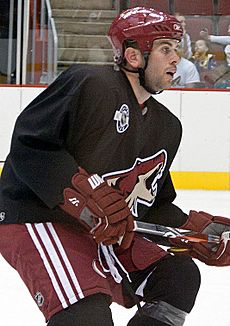
Here are some of the team's top records since moving to Phoenix:
- Most goals in a season: 52, Keith Tkachuk (1996–97)
- Most assists in a season: 53, Ray Whitney (2011–12)
- Most points in a season: 86, Keith Tkachuk (1996–97) and Clayton Keller (2022–23)
- Most penalty minutes in a season: 324, Daniel Carcillo (2007–08)
- Most goals in a season by a defenseman: 23, Oliver Ekman-Larsson (2014–15)
- Most points in a season by a defenseman: 59, Keith Yandle (2010–11)
- Most points in a season by a rookie: 65, Clayton Keller (2017–18)
- Most wins in a season by a goalie: 42, Ilya Bryzgalov (2009–10)
Team Captains
A team captain helps lead the team and talks to referees.
- Keith Tkachuk, 1996–2001
- Teppo Numminen, 2001–2003
- Shane Doan, 2003–2017
- Oliver Ekman-Larsson, 2018–2021
Images for kids
See also
 In Spanish: Arizona Coyotes para niños
In Spanish: Arizona Coyotes para niños
 | DeHart Hubbard |
 | Wilma Rudolph |
 | Jesse Owens |
 | Jackie Joyner-Kersee |
 | Major Taylor |


